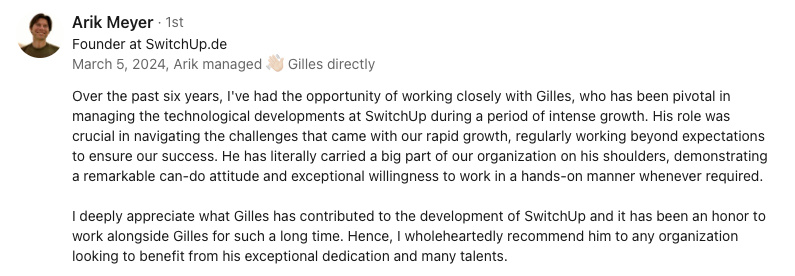Abstract:
The article discusses the growing importance of quantum computing and the associated demand for skilled professionals, particularly in Europe, where startups face unique challenges due to financial constraints, regulatory complexities, and a less mature ecosystem compared to the U.S. The European Union is investing in initiatives like the Quantum Flagship to build a robust quantum ecosystem and address skill shortages. Despite these hurdles, European startups can leverage their innovative projects and flexible work cultures to attract talent. Strategies for attracting and retaining quantum talent include offering competitive compensation packages, fostering partnerships with universities, building a strong employer brand, and emphasizing internal training and a collaborative work environment. Case studies, such as those of IQM Quantum Computers in Finland and Pasqal in France, illustrate how strategic hires and academia-industry collaborations can strengthen a startup's position in the quantum field. As quantum computing becomes mainstream, the demand for interdisciplinary skills will grow, necessitating continuous upskilling and collaboration across sectors to build a resilient talent pool.
The world is rapidly advancing towards a quantum computing future, creating a significant demand for skilled workers in this field. This presents challenges, especially for startups in Europe, where financial constraints and regulations can be complex. However, these challenges also present opportunities for growth and innovation. Quantum computing is no longer just an academic interest; it is becoming crucial in industries ranging from cryptography to data processing. For businesses aiming to secure their position in this high-tech area, understanding the global demand for quantum skills and finding effective ways to hire talent is essential.
Exploring the Quantum Talent Landscape
The demand for quantum computing skills is substantial, and European startups face unique challenges in this area. Quantum computing, once peripheral, is now central as industries recognize its potential to revolutionize various sectors.
The Global Demand for Quantum Skills
Quantum skills are increasingly sought after due to rapid technological advancements and interest from multiple industries. Companies worldwide are investing in quantum technology, aiming to transform fields like cryptography and data processing. This surge is driving up the need for individuals proficient in quantum mechanics and algorithms. It's not just academia anymore; businesses seek quantum solutions to remain competitive.
Education and training in quantum computing are now critical, with demand outpacing the supply of qualified professionals. More dedicated programs are needed to prepare individuals for these emerging roles. Having worked in tech hubs across different regions, I have observed a growing interest and need for skilled quantum professionals.
Quantum computing's unique capabilities, such as superposition and entanglement, allow for processing complex computations at unprecedented speeds, which is why industries are eager to adopt these technologies.
Europe's Quantum Ambitions
The European Union is intensifying its efforts in quantum technology by heavily investing in initiatives to close the skill gap. Programs like the Quantum Flagship demonstrate the EU's commitment to leading in this vital area. Europe aims to build a robust quantum ecosystem to match its technological ambitions and address current skill shortages.
However, European startups still face challenges in hiring talent. These challenges extend beyond financial constraints to include navigating complex regulations and less mature ecosystems compared to the U.S. This means that the EU's investments must be complemented by strategies to help startups compete globally. For instance, the Quantum Flagship program has already started to impact by funding research and fostering collaborations across Europe.
Challenges for European Startups
Startups in Europe are innovative but encounter specific hurdles in acquiring the quantum talent they need. Competing with larger U.S. companies is challenging, primarily due to financial constraints and a less developed ecosystem.
Financial Constraints and Ecosystem Maturity
Financial limitations are a significant issue for European startups. Unlike large U.S. tech companies, European startups often have less funding for research and development, making it difficult to offer competitive salaries and benefits. The ecosystem's development adds to the problem, as Europe's quantum industry, while expanding, lacks the depth of networks and partnerships found in the U.S.
Geographical and Regulatory Complexities
Europe's dispersed talent pool further complicates matters. With skilled professionals spread across different countries, startups face logistical challenges in recruitment. Varying regulations across Europe also make hiring complex.
Leveraging Unique Selling Points
Despite these obstacles, European startups have advantages. By offering unique projects and flexible work cultures, they can attract talent seeking innovation and autonomy. Highlighting their innovative work environments can make these startups appealing to professionals eager to work on cutting-edge projects. Drawing from my experience in European tech hubs, I've seen how startups can thrive by promoting their unique approaches and collaborative cultures.
Strategies to Attract Quantum Talent
To succeed in quantum computing, startups need effective recruitment strategies to attract top talent.
Recruitment Tactics
- Mission and Vision: Startups can stand out by sharing their mission and vision to attract people motivated by purpose. In the groundbreaking field of quantum computing, linking company goals to societal impacts can appeal to candidates seeking meaningful work.
- Dynamic Culture: Creating a dynamic company culture that emphasizes collaboration and innovation can further entice potential employees.
- Compensation Packages: Even with financial constraints, startups can be attractive by offering competitive compensation packages, including equity options. These provide long-term financial benefits, balancing out lower salaries.
- Partnerships: Collaborations with institutions or larger firms can enhance this strategy by providing access to shared resources and expertise.
Leveraging Partnerships
Collaborating with universities and research institutions is transformative for recruiting quantum talent. These partnerships offer startups direct access to emerging professionals and can lead to joint research initiatives, providing access to cutting-edge facilities and innovations.
These alliances boost a startup's reputation and open doors to funding opportunities, helping offset financial limits and supporting growth, creating a cycle of attraction and retention for skilled talent.
Building an Employer Brand
A strong employer brand is crucial for attracting top quantum talent. Startups can highlight their innovative spirit and the chance to work on groundbreaking projects. Fostering an inclusive and collaborative work culture that values diversity and open collaboration can create an environment where all voices are heard, promoting creative problem-solving and innovation.
Building a Quantum-Savvy Team
Building a team skilled in quantum technologies requires planning and a commitment to learning. By focusing on training and fostering a learning culture, organizations can equip their teams with the skills needed to innovate.
Internal Training Programs
Effective internal training starts with identifying skill gaps and setting clear goals to address them. Hands-on experience with quantum hardware and interactive learning techniques are key to impactful training. A mix of learning resources ensures comprehensive education, preparing employees for the demands of quantum roles. From my experience, incorporating diverse training methods, such as workshops and online modules, can significantly enhance learning outcomes.
Fostering a Learning Culture
Encouraging innovation and knowledge sharing boosts engagement and retention. Mentorship programs and cross-departmental collaboration support knowledge transfer and create a supportive network that encourages diverse perspectives and innovative solutions.
Case Studies of European Startups
IQM Quantum Computers in Finland exemplifies how strategic hires and partnerships can build a strong team. By recruiting top talent and partnering with institutions like Aalto University, they've positioned themselves as leaders in quantum computing.
Pasqal in France collaborates with academic institutions to push quantum technology boundaries. These partnerships enhance their capabilities and secure funding, demonstrating the impact of academia-industry collaboration.
Retaining Quantum Talent: Keeping the Best Minds Engaged and Fulfilled
Retaining top talent in quantum computing is as important as acquiring it. Companies need strategies to keep professionals engaged and committed.
Competitive Compensation and Development
Offering competitive salaries and clear career paths helps align employee ambitions with company goals. Continuous learning opportunities keep professionals engaged and show a commitment to their growth.
Work-Life Balance and Flexibility
Remote work options improve job satisfaction and expand talent acquisition possibilities. Flexibility reduces burnout, maintaining a healthy workforce and attracting potential hires.
Creating a Supportive Environment
Diverse hiring practices and mentorship programs foster an inclusive culture. Recognition systems and access to resources enhance engagement, reinforcing a supportive workplace that retains talent.
The Future of Quantum Workforce Development
As quantum computing becomes mainstream, the demand for specialized skills will grow. Businesses and educational institutions are preparing to meet this need.
Anticipated Trends in Quantum Demand
The demand for quantum skills will grow with increased industry adoption. Interdisciplinary skills will become more important as quantum computing merges with fields like AI and cryptography.
Education and Training Initiatives
Universities are expanding quantum science programs to equip students with the skills needed for the quantum era. International collaborations and national strategies bolster quantum research and skill development.
Preparing for Future Challenges
Emerging roles in quantum algorithms and cybersecurity highlight the need for ongoing upskilling. Collaboration across sectors will build a resilient talent pool ready for future demands.
Embracing quantum computing offers opportunities for innovation. As demand for quantum skills rises, European startups can turn challenges into success stories through strategic hiring and partnerships. A dynamic work culture and innovative projects can attract professionals eager to make an impact. Continuous learning and collaboration across sectors are key to staying ahead.
You might be interested by these articles:
- The Impact of Quantum Computing on Cybersecurity Strategies
- Revolutionizing Tech with Quantum Computing
- Quantum Computing's Next Leap





